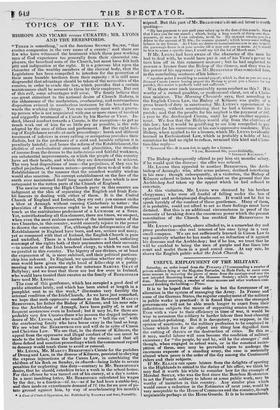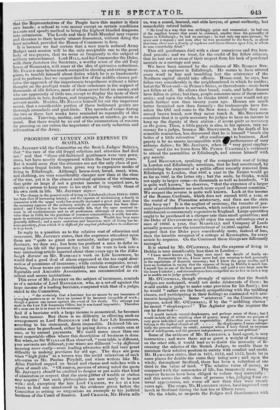USEFUL EMPLOYMENT OF THE MILITARY.
Saturday, an order issued from the Treasury (?) commanding a number of private soldiers lying at the Magazine Barracks, in Hyde Park, to assist some stone.masons in removing the pieces of stone from the carriage-road near the new intended Receiving.house of the Humane Society ; which was quickly done. Monday morning, a number of stone-masons and other workmen com- menced finishing the building.— Times.
It is to be hoped that this order is but the forerunner of an alteration in the system of managing the- Army. In France and some of the German States, the regular employment of the military in public works is practised : it is found that even the strongest governments will not be able much longer to exact from their industrious subjects the means of supporting armies in idleness. Even with a view to their efficiency in time of war, it would be wise to accustom the soldiery to harder labour than boot-cleaning and musket-polishing. But it is derogatory, we suppose, in the opinion of martinets, to the military profession to be employed in labour which has for its object any thing less dignified than the cutting of throats or the destruction of cities. Be this as it may, useful labour will soon become the condition of military existence ; for "the people, by and by, will be the stronger ;" and though, when engaged in actual wars, or in the constant antici- pation of them, men may be prevailed upon to undergo the enormous expense of a standing army, the case is materially altered when peace is the order of the day among the Continental rulers and their subjects. If Mr. ELLICE can spare leisure from the delights of sporting in the Highlands to attend to the duties of his office, we think he may find it worth his while to consider how far the example of Marshal SOULT, who was the first since the Bourbon Restoration to set the French soldiery to labour at some public work, may be worthy of imitation in this country. Any similar plan which would cause a reduction in the Estimates of next year, would be very acceptable to the House of Commons and the country, though unpalatable perhaps at the Horse Guards. It is to be remembered,
that the Representatives of the People have this matter in their own hands : a refusal to vote money except on certain conditions is a sure and speedy method to bring the highest-blooded dragoons into submission. The Lords and their Field-Marshal may vapour and threaten to their hearts utmost discontent, without doing the least mischief, provided the House of Commons is firm.
It is because we feel certain that a very much reduced Army Budget next session will be the only acceptable one to the great body of tax-payers, that we recur so frequently to the subject of military retrenchment. Lord HILL, and his Commander the Duke, with their factotum the Secretary, a worthy scion of the old Tory house of SOMERAT, will sneer at the idea of eextensive reductions. Mr. E Etc E may be too much occupied in shooting and eating moor- game, to trouble himself about duties which he is so handsomely paid to perform ; but we suspect that few of the middle classes per- ceive the approach of the importunate taxgatherer without a bitter thought on the prodigal waste of their substance in the support of thousands of idle fellows, most of whom never faced an enemy, and who are apparently of little use, except to display the taste of their commanders in lace, feathers, and trappings, for the admiration of servant-maids. Besides, Mr.ELLice hiniself let out the important secret, that a considerable portion of these bedizened gentry are thorough scoundrels and gaol-birds. The records, of crime during the two or three last weeks have reminded us repeatedly of this confession. Thieving, mutiny, and attempts at murder, go on as usual. But there would be no end of the enumeration of reasons for pressing on our rulers the importance of an early reduction and reformation of the Army.



















 Previous page
Previous page